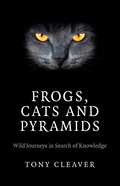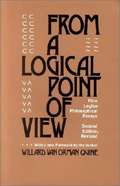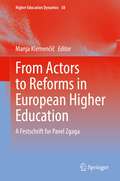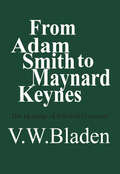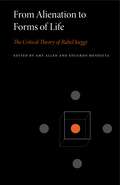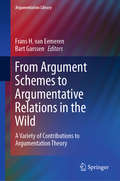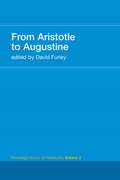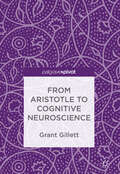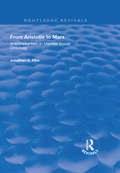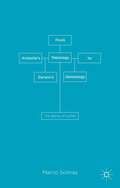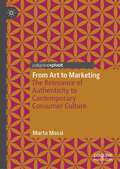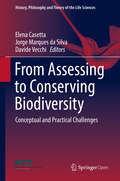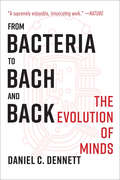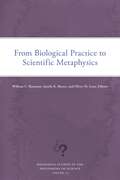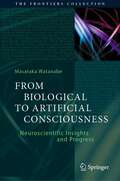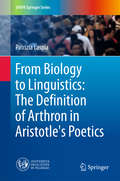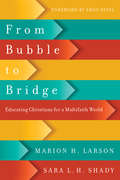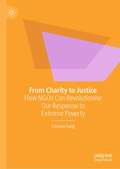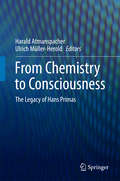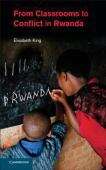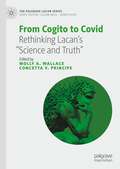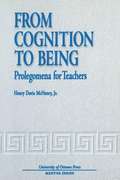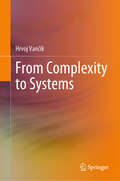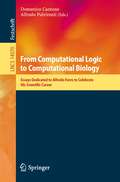- Table View
- List View
Frogs, Cats and Pyramids: Wild Journeys in Search of Knowledge
by Tony CleaverImagine a group of people in a mountain retreat seeking to understand why we categorize knowledge into various academic disciplines, each with its own way of looking at reality. Mathematics; the Arts, Language; Humanities; Science; Computer Technology, and Religion, Faith and Ethics -- that is the way we learn to see the world. Each discipline locks us into a way of seeing that separates us from other ways. Imagine a cynic, a professional thief who seeks only to exploit others. Imagine if a specialist academic wanted to tell a story, relate an adventure that in some way resonates with his or her way of seeing things. How would the mixed company enjoy these various ways of seeing the world?
From A Logical Point Of View: Nine Logico-philosophical Essays
by Willard van Orman QuineSeveral of these essays have been printed whole in journals; others are in varying degrees new. Two main themes run through them. One is the problem of meaning, particularly as involved in the notion of an analytic statement. The other is the notion of ontological, commitment, particularly as involved in the problem of universals.
From Actors to Reforms in European Higher Education: A Festschrift for Pavel Zgaga (Higher Education Dynamics #58)
by Manja KlemenčičThis volume addresses the conceptions of actors and actorhood in higher education research. It explores the range of actors that are (or should be) recognized and theorized in higher education research, the processes that shape actorhood in the higher education reforms and explores the relations between the actors and higher education reforms. Drawing on a range of theoretical frameworks and research projects, the volume provides in-depth analyses of higher education actors and reform issues through institutional, system or international comparative perspective. The volume celebrates and is in conversation with the intellectual contributions of Professor Pavel Zgaga whose work advances our understanding of actors and actorhood in higher education and higher education reforms.
From Adam Smith to Maynard Keynes: The Heritage of Political Economy
by Vincent BladenIn this survey of the great exponents of the classical tradition, Vincent Bladen examines the thought and works of Adam Smith, T.R. Malthus, Henry Thornton, David Ricardo, J.S. Mill, Karl Marx, W.S. Jevons, Alfred Marshall, and John Maynard Keynes, and relates their views to modern situations. This is a personal introduction by one of Canada's senior economists to some of the great books in the English literature of political economy. Vincent Bladen wrote it to induce an interest in and an understanding of the economic classics, in the belief that contemplation of those works will increase our understanding of current economic writing and current economic problems.For the purpose of discussing the development of 'wealth'--the major concern of economists--Bladen defines four periods within the classical tradition, and demonstrates that in each there appeared a characteristic preoccupation with a particular area of economics. From Adam Smith to John Stuart Mill the principal concern was productivity and growth; the neoclassical economists represented by Jevons and Marshall emphasized the problems of allocation of given productive resources; depressions in the twenties and thirties and the impact of Keynesian theory led to a preoccupation with 'employment,' and after World War II attention shifted to 'growth.' Bladen is critical of previous histories of economic thought: 'by isolating the treatment of one element in a complex and integrated system of thought they frequently misrepresent each author's treatment of the particular element.' In this work he attempts to show each aspect of the work of the economists he has selected in the context of an integrated whole.
From Alienation to Forms of Life: The Critical Theory of Rahel Jaeggi (Penn State Series in Critical Theory #1)
by Amy Allen Eduardo MendietaThe wide-ranging work of Rahel Jaeggi, a leading voice of the new generation of critical theorists, demonstrates how core concepts and methodological approaches in the tradition of the Frankfurt School can be updated, stripped of their dubious metaphysical baggage, and made fruitful for critical theory in the twenty-first century. In this thorough introduction to Jaeggi’s work for English-speaking audiences, scholars assess and critique her efforts to revitalize critical theory.Jaeggi’s innovative work reclaims key concepts of Hegelian-Marxist social philosophy and reads them through the lens of such thinkers as Adorno, Heidegger, and Dewey, while simultaneously putting them into dialogue with contemporary analytic philosophy. Structured for classroom use, this critical introduction to Rahel Jaeggi is an insightful and generative confrontation with the most recent transformation of Frankfurt School–inspired social and philosophical critical theory. This volume features an essay by Jaeggi on moral progress and social change, essays by leading scholars engaging with her conceptual analysis of alienation and the critique of forms of life, and a Q&A between Jaeggi and volume coeditor Amy Allen. For scholars and students wishing to engage in the debate with key contemporary thinkers over the past, present, and future(s) of critical theory, this volume will be transformative.
From Alienation to Forms of Life: The Critical Theory of Rahel Jaeggi (Penn State Series in Critical Theory)
by John Christman Amy Allen Eduardo Mendieta Frederick Neuhouser Rahel Jaeggi Rocío Zambrana Robin Celikates Max Pensky Daniel LoickThe wide-ranging work of Rahel Jaeggi, a leading voice of the new generation of critical theorists, demonstrates how core concepts and methodological approaches in the tradition of the Frankfurt School can be updated, stripped of their dubious metaphysical baggage, and made fruitful for critical theory in the twenty-first century. In this thorough introduction to Jaeggi’s work for English-speaking audiences, scholars assess and critique her efforts to revitalize critical theory.Jaeggi’s innovative work reclaims key concepts of Hegelian-Marxist social philosophy and reads them through the lens of such thinkers as Adorno, Heidegger, and Dewey, while simultaneously putting them into dialogue with contemporary analytic philosophy. Structured for classroom use, this critical introduction to Rahel Jaeggi is an insightful and generative confrontation with the most recent transformation of Frankfurt School–inspired social and philosophical critical theory. This volume features an essay by Jaeggi on moral progress and social change, essays by leading scholars engaging with her conceptual analysis of alienation and the critique of forms of life, and a Q&A between Jaeggi and volume coeditor Amy Allen. For scholars and students wishing to engage in the debate with key contemporary thinkers over the past, present, and future(s) of critical theory, this volume will be transformative.
From Argument Schemes to Argumentative Relations in the Wild: A Variety of Contributions to Argumentation Theory (Argumentation Library #35)
by Frans H. van Eemeren Bart GarssenThis volume comprises a selection of contributions to the theorizing about argumentation that have been presented at the 9th conference of the International Society for the Study of Argumentation (ISSA), held in Amsterdam in July 2018. The chapters included provide a general theoretical perspective on central topics in argumentation theory, such as argument schemes and the fallacies. Some contributions concentrate on the treatment of the concept of conductive argument. Other contributions are dedicated to specific issues such as the justification of questions, the occurrence of mining relations, the role of exclamatives, argumentative abduction, eudaimonistic argumentation and a typology of logical ways to counter an argument. In a number of cases the theoretical problems addressed are related to a specific type of context, such as the burden of proof in philosophical argumentation, the charge of committing a genetic fallacy in strategic manoeuvring in philosophy, the necessity of community argument, and connection adequacy for arguments with institutional warrants.The volume offers a great deal of diversity in its breadth of coverage of argumentation theory and wide geographic representation from North and South America to Europe and China.
From Aristotle to Augustine: Routledge History of Philosophy Volume 2
by David FurleyThis second volume opens with Aristotle's immense influence on philosophy from the beginnings of Christian philosophy in the fifth century AD.
From Aristotle to Cognitive Neuroscience
by Grant GillettFrom Aristotle to Cognitive Neuroscience identifies the strong philosophical tradition that runs from Aristotle, through phenomenology, to the current analytical philosophy of mind and consciousness. In a fascinating account, the author integrates the history of philosophy of mind and phenomenology with recent discoveries on the neuroscience of conscious states. The reader can trace the development of a neuro-philosophical synthesis through the work of Aristotle, Kant, Wittgenstein, Husserl, Merleau-Ponty, Brentano and Hughlings-Jackson, among others, and so explore contemporary philosophical puzzles surrounding consciousness and its relation to cerebral synchrony and connectedness. Of interest to students and scholars of neuroethics, neurophilosophy and philosophy of mind, as well as philosophy of psychiatry, From Aristotle to Neuroscience demonstrates the real essence of consciousness as it increasingly connects with philosophy, law, morality, aesthetics, and spirituality.
From Aristotle to Marx: Aristotelianism in Marxist Social Ontology (Routledge Revivals)
by Jonathan E. PikeFirst published in 1999, this volume from Dr. Jonathan E. Pike is original and provocative and integrates sources from the history of ideas, analytical philosophy, and contemporary social theory. Pike has produced an overall account of Marx which focuses on the concept of human potential and clearly explains its ontological basis. Anyone interested in Marx studies will be indebted to this incisive discussion of the philosophical foundations of Marx’s work.
From Aristotle’s Teleology to Darwin’s Genealogy
by Marco SolinasStarting with Aristotle and moving on to Darwin, Marco Solinas outlines the basic steps from the birth, establishment and later rebirth of the traditional view of living beings, and its overturning by evolutionary revolution. The classic framework devised by Aristotle was still dominant in the 17th Century world of Galileo, Harvey and Ray, and remained hegemonic until the time of Lamarck and Cuvier in the 19th Century. Darwin's breakthrough thus takes on the dimensions of an abandonment ofthe traditional finalistic theory. It was a transition exemplified in the morphological analysis of useless parts, such as the sightless eyes of moles, already discussed by Aristotle, which Darwin used as a crowbar to unhinge the systematic recourse to final causes. With many excerpts, a chronological sequence and an analytical approach, this book follows the course of the two conceptions that have shaped the destiny of living beings in western culture.
From Art to Marketing: The Relevance of Authenticity to Contemporary Consumer Culture
by Marta MassiTaking a new approach to a relatively underexplored area, this book examines the concept of authenticity and its relevance to marketing management. The author draws on several disciplines, including arts, philosophy, sociology and psychology, as well as focusing on important sub-fields within the field of marketing such as consumer behaviour and tourism. Presenting data from interviews with managers and consumers, and summarising and critiquing recent developments within the field, From Arts to Marketing is a timely and much-needed addition to literature and will be useful to those researching consumer behaviour, brand management and marketing more generally.
From Assessing to Conserving Biodiversity: Conceptual and Practical Challenges (History, Philosophy and Theory of the Life Sciences #24)
by Elena Casetta Jorge Marques da Silva Davide VecchiThis open access book features essays written by philosophers, biologists, ecologists and conservation scientists facing the current biodiversity crisis. Despite increasing communication, accelerating policy and management responses, and notwithstanding improving ecosystem assessment and endangered species knowledge, conserving biodiversity continues to be more a concern than an accomplished task. Why is it so?The overexploitation of natural resources by our species is a frequently recognised factor, while the short-term economic interests of governments and stakeholders typically clash with the burdens that implementing conservation actions imply. But this is not the whole story. This book develops a different perspective on the problem by exploring the conceptual challenges and practical defiance posed by conserving biodiversity, namely: on the one hand, the difficulties in defining what biodiversity is and characterizing that “thing” to which the word ‘biodiversity’ refers to; on the other hand, the reasons why assessing biodiversity and putting in place effective conservation actions is arduous.
From Bacteria to Bach and Back: The Evolution of Minds
by Daniel C. DennettOne of America’s foremost philosophers offers a major new account of the origins of the conscious mind. How did we come to have minds? For centuries, this question has intrigued psychologists, physicists, poets, and philosophers, who have wondered how the human mind developed its unrivaled ability to create, imagine, and explain. Disciples of Darwin have long aspired to explain how consciousness, language, and culture could have appeared through natural selection, blazing promising trails that tend, however, to end in confusion and controversy. Even though our understanding of the inner workings of proteins, neurons, and DNA is deeper than ever before, the matter of how our minds came to be has largely remained a mystery. That is now changing, says Daniel C. Dennett. In From Bacteria to Bach and Back, his most comprehensive exploration of evolutionary thinking yet, he builds on ideas from computer science and biology to show how a comprehending mind could in fact have arisen from a mindless process of natural selection. Part philosophical whodunit, part bold scientific conjecture, this landmark work enlarges themes that have sustained Dennett’s legendary career at the forefront of philosophical thought. In his inimitable style—laced with wit and arresting thought experiments—Dennett explains that a crucial shift occurred when humans developed the ability to share memes, or ways of doing things not based in genetic instinct. Language, itself composed of memes, turbocharged this interplay. Competition among memes—a form of natural selection—produced thinking tools so well-designed that they gave us the power to design our own memes. The result, a mind that not only perceives and controls but can create and comprehend, was thus largely shaped by the process of cultural evolution. An agenda-setting book for a new generation of philosophers, scientists, and thinkers, From Bacteria to Bach and Back will delight and entertain anyone eager to make sense of how the mind works and how it came about.
From Biological Practice to Scientific Metaphysics (Minnesota Studies in the Philosophy of Science #23)
by Oliver M. LeanHow analyzing scientific practices can alter debates on the relationship between science and reality Numerous scholarly works focus solely on scientific metaphysics or biological practice, but few attempt to bridge the two subjects. This volume, the latest in the Minnesota Studies in the Philosophy of Science series, explores what a scientific metaphysics grounded in biological practices could look like and how it might impact the way we investigate the world around us. From Biological Practice to Scientific Metaphysics examines how to reconcile the methods of biological practice with the methods of metaphysical cosmology, notably regarding the origins of life. The contributors take up a wide range of traditional metaphysics and philosophy of science topics, including natural kinds, medicine, ecology, genetics, scientific pluralism, reductionism, operationalism, mechanisms, the nature of information, and more. Many of the chapters represent the first philosophical treatments of significant biological practices. From causality and complexity to niche constructions and inference, the contributors review and discuss long-held objections to metaphysics by natural scientists. They illuminate how, in order to learn about the world as it truly is, we must look not only at what scientists say but also what they do: for ontology cannot be read directly from scientific claims. Contributors: Richard Creath, Arizona State U; Marc Ereshefsky, U of Calgary; Marie I. Kaiser, Bielefeld U; Thomas A. C. Reydon, Leibniz U Hannover and Michigan State U; Lauren N. Ross, U of California, Irvine; Rose Trappes, U of Exeter; Marcel Weber, U of Geneva; William C. Wimsatt, U of Chicago. Retail e-book files for this title are screen-reader friendly with images accompanied by short alt text and/or extended descriptions.
From Biological to Artificial Consciousness: Neuroscientific Insights and Progress (The Frontiers Collection)
by Masataka WatanabeHow does consciousness emerge from a brain that consists only of physical matter and electrical / chemical reactions? The deep mysteries of consciousness have plagued philosophers and scientists for thousands of years. This book approaches the problem through scientific studies that shed light on the neural mechanism of consciousness, and furthermore, delves into the possibility of artificial consciousness, a phenomenon that may ultimately solve the mystery. Finally, two key suggestions made in the book, namely, a method to test machine consciousness and a theory hypothesizing that consciousness emerges from a neural algorithm, reveal a novel and credible pathway to mind-uploading.The original Japanese version of this book has become a best-seller in popular neuroscience and has even led to a neurotech startup for mind-uploading.
From Biology to Linguistics: The Definition of Arthron in Aristotle's Poetics (Unipa Springer Ser.)
by Patrizia LaspiaThis book attempts to solve Aristotle's definition of arthron in the XX chapter of the Poetics by seeing it in a new light. This definition has always been considered an unsolvable problem. Starting with a detailed analysis of the Greek text, and of the various attempts to emend the text in order to make sense of it, the book provides an analytical description of the critical literature, showing that the solutions proposed up to now need to be revised.The possible solution is found in viewing the XX chapter of the Poetics not as a classification of parts of speech, as it was usually supposed, but by considering the biological definitions of arthron in Aristotle's corpus. This leads to the conclusion that, in linguistics as well as in biology, arthron is a "joint". In this light, the book offers a new textual conjecture for the first example of arthron in the Poetics.
From Bubble to Bridge: Educating Christians for a Multifaith World
by Eboo Patel Marion H. Larson Sara L. ShadyUnderstanding our religious neighbors is more important than ever—but also more challenging. bridgesFrom Bubble to Bridge
From Charity to Justice: How NGOs Can Revolutionise Our Response to Extreme Poverty
by Vincent FangThis book focuses on the ethical demands of extreme poverty and develops a political theory of practical change. Welding together political realism and moral aspirations, it argues that a re-imagined form of development NGO can help the global North break free from the dominant and persistent charity paradigm and drift towards a justice-based understanding of extreme poverty. It offers an original explanation of why the charity paradigm persists and why the “justice not charity” messages from development NGOs have changed few minds. The author argues that anyone concerned with a paradigm shift from charity to justice need to radically rethink the problem of political communication: who should communicate what messages about extreme poverty in what ways? Based on a rational choice critique of the competitive development NGO sector, the author calls for sector-wide reform and the emergence of a new political agent – the Avant-garde NGO - which transcends the charity frame that NGOs currently find themselves locked in. Further, inspired by literary theory and social psychology, he offers a fresh account of how the Avant-garde NGO could, through reflective public engagement, induce attitude change and lead genuine social and political reform.
From Chemistry to Consciousness
by Ulrich Müller-Herold Harald AtmanspacherThis book reflects on the significant and highly original scientific contributions of Hans Primas. A professor of chemistry at ETH Zurich from 1962 to 1995, Primas continued his research activities until his death in 2014. Over these 50 years and more, he worked on the foundations of nuclear magnetic resonance spectroscopy, contributed to a number of significant issues in theoretical chemistry, helped to clarify central topics in quantum theory and the philosophy of physics, suggested innovative ways of addressing interlevel relations in the philosophy of science, and introduced cutting-edge approaches in the flourishing young field of scientific studies of consciousness. His work in these areas of research and its continuing impact is described by noted experts, colleagues, and collaborators of Primas. All authors contextualize their contributions to facilitate the mutual dialog between these fields.
From Classrooms to Conflict in Rwanda
by Elisabeth KingThis book questions the conventional wisdom that education builds peace by exploring the ways in which ordinary schooling can contribute to intergroup conflict. Based on fieldwork and comparative historical analysis of Rwanda, it argues that from the colonial period to the genocide, schooling was a key instrument of the state in contributing to the construction, awareness, collectivization and inequality of ethnic groups in Rwanda - all factors that underlay conflict. The book further argues that today's post-genocide schools are dangerously replicating past trends. This book is the first to offer an in-depth study of education in Rwanda and to analyze its role in the genesis of conflict. The book demonstrates that to build peace, we cannot simply prescribe more education, but must understand who has access to schools, how schools are set up, and what and how they teach.
From Cogito to Covid: Rethinking Lacan’s “Science and Truth” (The Palgrave Lacan Series)
by Concetta V. Principe Molly A. WallaceThis edited collection examines the contemporary relevance of Lacan’s 1965 essay “Science and Truth” to debates on science, psychoanalysis, ethics and truth. In doing so, it re-considers the established understanding of its argument that psychoanalysis is the only science for the human subject. Over fifty years after Lacan attempted to formalize the relationship between science and psychoanalysis in “Science and Truth,” this volume returns to the categorically systematic yet deeply puzzling ideas of this lecture-turned-essay. The volume begins with a rigorous analysis of the formal logic animating the cogito, which serves as a foundation for the remainder of the book to force a confrontation between the themes laid out in “Science and Truth” and the cultural, intellectual, political, economic, and, of course, scientific movements that we face today. The following five chapters examine various contemporary phenomena, including the destabilizing forces of post-truthism and political nihilism, the ‘non-science’ of filmic depictions of science, the prosopopeia of Lacan’s so-called secular Name of the Father, the pseudoscientific discourse of involuntary celibates, or ‘incels,’ and, finally, the alliance between science and capitalism that has developed out of the Covid-19 pandemic. This project offers an important contribution to contemporary debates about science and ethics that will be of interest to academics working in psychoanalytic and critical theory, and the philosophy and history of science; as well as to clinicians.
From Cognition to Being: Prolegomena for Teachers
by Henry Davis Mchenry Jr.Teachers must constantly invent and re-invent ways of being together with their students to enable both a shared mastery and a shared apprenticeship.
From Complexity to Systems
by Hrvoj VančikThis book sheds new light on the interactions between the science of complexity and the science of systems. Though both of these fields have been independently studied extensively, their interrelations have not been satisfactorily analyzed. By a superficial view, both the sciences are based on the same principles of the holistic behavior of the ensembles consisting of components. The author providing an expert analysis on the theory of complexity and bridges the gap to generalize it, by elaborating on all the observable manifestations of complex forms and behaviors and explaining how it is related to general theory of systems.Particular attention is given to the use of chemical concepts throughout the text to demonstrate the theories as well as the interactions between the two. The central point of this book is the new rational representation of systems that origins from some chemical concepts about the structure of molecules and graph theoretical chemical theory. Thisnovel text appeals to experienced researchers, students, and all those curious about theories of systems, complexities, and theoretical chemistry.
From Computational Logic to Computational Biology: Essays Dedicated to Alfredo Ferro to Celebrate His Scientific Career (Lecture Notes in Computer Science #14070)
by Domenico Cantone Alfredo PulvirentiAlfredo Ferro’s impact on information technology has traversed diverse domains, encompassing Computational Logic, Data Mining, Bioinformatics, and Complex Systems. After first studying Mathematics at the University of Catania, he received a Ph.D. in Computer Science from NYU in 1981, working under the supervision of Jacob Theodor (Jack) Schwartz. He returned to the University of Catania where he established the Computer Science undergraduate program, served as the coordinator of the Ph.D. program in Computer Science, cofounded the Ph.D. program in Biology, Human Genetics, and Bioinformatics, and retired as a full professor in 2021.Alfredo’s academic career as a computer scientist is characterized by two distinct research phases: Computational Logic until approximately 1995, followed by a notable focus on Data Mining and Bioinformatics. The contributions in this volume reflect the quality and the scope of his personal and collaborative successes.He also taught andinspired many excellent scientists. A pioneering initiative was to establish summer schools for Ph.D. students in 1989, leading to the so-called Lipari School, now the J.T. Schwartz International School for Scientific Research, where Alfredo continues to serve as director. This prestigious series includes schools focused on Computer Science, Complex Systems, and Computational Biology, featuring world-class scientists as lecturers and mentors.
